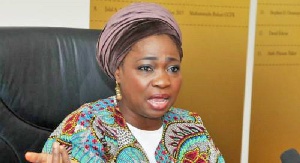 Abike Dabiri-Erewa, Chief Executive Officer of Nigerians In Diaspora Commission
Abike Dabiri-Erewa, Chief Executive Officer of Nigerians In Diaspora Commission
The ongoing spate between Ghanaian and Nigerian traders in the former country’s retail markets has taken an ugly turn for the worse as 753 of the latter have signed a document alleging xenophobic attacks against them and requesting to be taken home by the Nigerian federal government.
The traders, some of whom have spent more than 25 years in Ghana, have faced the closure of theirs shops for no apparent reason, Abike Dabiri-Erewa, Chief Executive Officer of Nigerians In Diaspora Commission, incorrectly claimed on Monday in a Channels TV (a widely watched and reputed Nigerian private television station) interview.
Interestingly the reason for the closure – that Ghana’s investment code forbids foreigners from retailing in Ghana with less than US$1 million in capital – was not explained, leaving viewers with the impression that Ghana has adopted a South Africa – type xenophobic attitude against Nigerians engaged in business in their country.
Fortunately however the Nigerian government itself is aware of the true situation even though it does not approve of the Ghanaian government’s stance which it sees as resulting from political exigencies ahead of the December 7 general elections.
DabirI-Erewa said so far three ministries have been drafted to try and resolve the conflict — they are, Ministries of Foreign Affairs, Interior, and Trade and Investment.
She said, “The delegation is in Nigeria to tell the government that they want to return, and 753 actually signed the document that says they want to return to Nigeria.
“So with this request from them, what is going on now is that the three ministers involved will have some engagement with them to see what actually should be the next thing.
“Now you’ve said you want to come to your country, so there should be no problem about that. They are Nigerians and we are proud of them and glad to return them home.
“But they must return to something meaningful. Like one of them said to me when they came to NIDCOM office, a lot of them have been there for over 25 years; so just uprooting yourself for not committing any crime – the only crime they’ve committed is that they are very good at their trade, at their jobs.”
She added that because of the upcoming elections in the country, the Ghanaian President would not want to side against his people, who are demanding the shutting down of Nigerian businesses.
“Let’s face it, the President of Ghana will not want to go against his own citizens. And the majority of the Ghanaian traders have said ‘we don’t want them’. So after the elections, maybe they will now open. But they will close again. So they can’t be pawns in a game of chess in Ghana,” she said.
But while she agrees that the stance of Ghana’s government is largely political the viewers following the Nigerian traders inaccurate version of the situation are unaware of the true situation, and this could create unnecessary tension between the citizens of the two countries.
In Ghana the conventional wisdom is that the Nigerian traders are trying to take advantage of the situation to enjoy significant support from their government supposedly towards relocating them at home.
Despite the untruths being employed by the Nigerian traders – and their government which is employing similar populist stance to the one it is accusing the Government of Ghana of – there are genuine worries in Ghana that the situation will damage Ghana’s credentials as a proponent of economic integration in the region. The African Continental Free Trade Agreement is due to commence from January 1, 2021 and Ghana has succeeded in winning the right to host its secretariat as a pillar towards establishing itself as a regional hub for business support services such as for financial services and air transport.